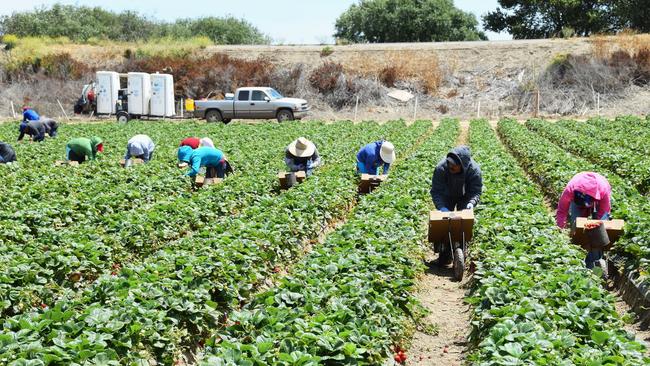Unemployed youth should be conscripted
Young, healthy Australians who live with their parents and receive a taxpayer-funded JobSeeker allowance should be conscripted to work on farms, says Peter Gleeson.
Opinion
Don't miss out on the headlines from Opinion. Followed categories will be added to My News.
War and fruit picking may not have much in common but in this year of living dangerously there are parallels we just can’t ignore.
For many older Australians, conscription is a dirty word as young Aussie men were forced to go to war – many never returning – reviving painful and heartbreaking memories.
In 1939, at the start of World War II, all unmarried men aged over 21 were called up for three months of military training. Conscription was then introduced in mid-1942, when all men aged 18-35 and single men aged 35-45 were required to join a citizens military force. Many fought against the Japanese in Papua New Guinea.
It’s against that backdrop of sending young Australian men off to war that we face our greatest challenge in 80 years – the health and economic threat of a coronavirus pandemic. Like war, it kills indiscriminately. It is our very own 21st century unseen enemy.
During such challenging times, it is important that our decision-makers think outside the box.
As Prime Minister Scott Morrison has said repeatedly, these are uncharted waters and we must throw the rule book out to meet the challenge.
Right now, on fruit and vegetable farms around Australia, farmers are struggling to get people to pick their produce.
Normally, 130,000 backpackers would swarm on to the farms, earning money to keep their holiday dream alive.
With COVID-19, those numbers have dropped by 50,000. There are fears some fruit may rot.
The sad reality is that just 8 per cent of those who pick fruit and vegetables in this country are Australians.
Now, the unions are muscling their way into the debate about seasonal fruit pickers.
An alliance of unions is calling for the end of the working holiday visa. The Australian Workers Union, the Shop and Allied Distributors Union and the Transport Workers Union want the visa removed, effectively stopping backpackers from picking fruit.
The horticulture sector estimates removing backpackers from the fresh food sector will cost the industry about $13bn.
The unions claim the backpacker program is rife with exploitation.
They argue that the wages are so low that Australians won’t work. What bulldust.
The bottom line is that if farmers can’t use backpackers to pick their fruit, much of it will rot. Those who know these things say a good fruit picker can earn $1500 a week in the right conditions.

The sad reality is that many young, pampered Australians have an aversion to hard work.
Nestled snugly into the comforts of home, their meals and washing is sorted.
They are happy to cop the $1500 JobKeeper payment until it runs out. It has now been extended until at least March next year.
Until we get young Australians working for a living, agricultural producers will continue to rely on backpackers.
So here’s the solution. Young, healthy Australians who live with their parents and receive a taxpayer-funded JobSeeker allowance should be conscripted to work on farms.
They should be tested for COVID-19 and, once cleared, pack their bags and be sent via bus to fruit and vegetable picking areas for three months.
They would learn new skills, earn good money and be a benefit to the country, rather than a drain on welfare.
They may even make some new friends. Imagine that.
As for the unions, they need to butt out of this debate. They’ve done enough damage helping people like Daniel Andrews get into power.
